
The Chindits, officially known as Long Range Penetration Groups, were special operations units of the British and Indian armies which saw action in 1943–1944 during the Burma Campaign of World War II. Brigadier Orde Wingate formed them for long-range penetration operations against the Imperial Japanese Army, especially attacking lines of communication deep behind Japanese lines.
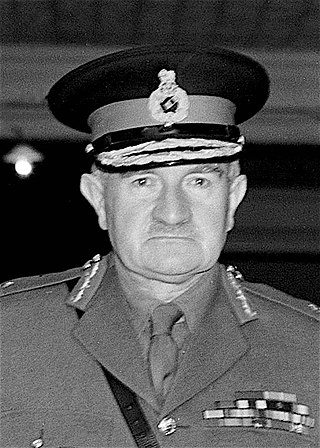
Field Marshal William Joseph Slim, 1st Viscount Slim,, usually known as Bill Slim, was a British military commander and the 13th Governor-General of Australia.
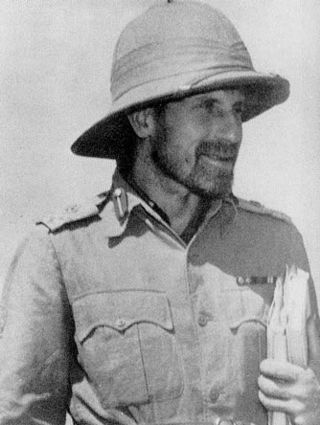
Major General Orde Charles Wingate, was a senior British Army officer known for his creation of the Chindit deep-penetration missions in Japanese-held territory during the Burma Campaign of the Second World War.

The South Staffordshire Regiment was a line infantry regiment of the British Army in existence for only 68 years. The regiment was created in 1881 under the Childers Reforms by the amalgamation of the 38th Regiment of Foot and the 80th Regiment of Foot. The regiment saw service in the Second Boer War, World War I and World War II.

The Northern Combat Area Command (NCAC) was a subcommand of the Allied South East Asia Command (SEAC) during World War II. It controlled Allied ground operations in northern Burma. For most of its existence, NCAC was commanded by United States Army General Joseph "Vinegar Joe" Stilwell. In 1945 after Stilwell was recalled, his deputy, Lieutenant General Daniel Sultan, was promoted to and assumed command.

The Burma campaign was a series of battles fought in the British colony of Burma. It was part of the South-East Asian theatre of World War II and primarily involved forces of the Allies against the invading forces of the Empire of Japan. Imperial Japan was supported by the Thai Phayap Army, as well as two collaborationist independence movements and armies. Nominally independent puppet states were established in the conquered areas and some territories were annexed by Thailand. In 1942 and 1943, the international Allied force in British India launched several failed offensives to retake lost territories. Fighting intensified in 1944, and British Empire forces peaked at around 1 million land and air forces. These forces were drawn primarily from British India, with British Army forces, 100,000 East and West African colonial troops, and smaller numbers of land and air forces from several other Dominions and Colonies. These additional forces allowed the Allied recapture of Burma in 1945.

Michael Allmand VC was an English Second World War recipient of the Victoria Cross, the highest and most prestigious award for gallantry in the face of the enemy that can be awarded to British and Commonwealth forces.

The South-East Asian Theatre of World War II consisted of the campaigns of the Pacific War in the Philippines, Thailand, Indonesia, Indochina, Burma, India, Malaya and Singapore between 1941 and 1945.
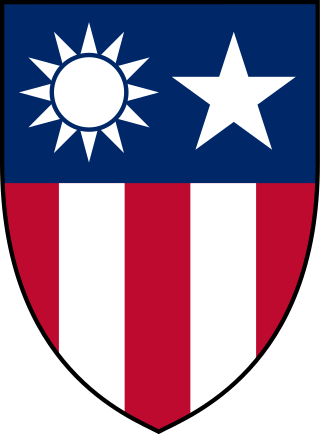
China Burma India Theater (CBI) was the United States military designation during World War II for the China and Southeast Asian or India–Burma (IBT) theaters. Operational command of Allied forces in the CBI was officially the responsibility of the Supreme Commanders for South East Asia or China. In practice, U.S. forces were usually overseen by General Joseph Stilwell, the Deputy Allied Commander in China; the term "CBI" was significant in logistical, material and personnel matters; it was and is commonly used within the US for these theaters.

Lieutenant General Walter David Alexander Lentaigne,, also known as Joe Lentaigne, was a senior officer in the British Indian Army.

Brigadier James Michael Calvert, was a British Army officer who was involved in special operations in Burma during the Second World War. He participated in both Chindit operations and was instrumental in popularizing the unorthodox ideas of Orde Wingate. He frequently led attacks from the front, a practice that earned him the nickname amongst the men under his command of "Mad Mike."
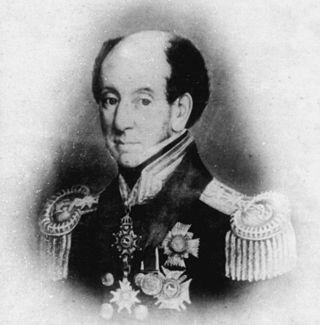
Sir James John Gordon Bremer was a British Royal Navy officer. He served in the Napoleonic Wars against France, the First Anglo-Burmese War in Burma, and the First Opium War in China.
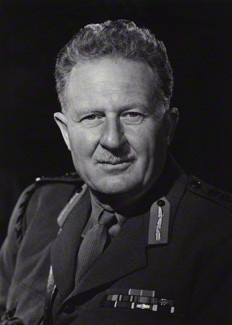
Field Marshal Sir Francis Wogan Festing, was a senior British Army officer. His most important posts were as Commander of British Forces in Hong Kong, General Officer Commanding (GOC) British Troops in Egypt (1952), GOC Eastern Command (1954), Commander-in-Chief Far East Land Forces (1956), and Chief of the Imperial General Staff (1958–61). He saw active service in the Second World War, taking a prominent role in Operation Ironclad and the Arakan offensive of the Burma campaign, and later advised the British government on ending conscription and reducing the size of the army by fifteen battalions.

The 9th Gorkha Rifles is a Gorkha infantry regiment of the Indian Army and, previously, the British Army. The regiment was initially formed by the British in 1817, and was one of the Gurkha regiments transferred to the Indian Army after independence as part of the tripartite agreement in 1947. This Gorkha regiment mainly recruits soldiers who come from Nepal's Gorkhali Kshatriya community i.e. the Chhetri and Thakuri clans. Domiciled Indian Gorkhas are also recruited, and they form about 20 percent of the regiment's total strength. The 9 Gorkha Rifles is one of the seven Gorkha regiments of the Indian Army. The other regiments are 1 GR, 3 GR, 4 GR, 5 GR (FF), 8 GR and 11 GR.

The fighting in the Burma campaign in 1944 was among the most severe in the South-East Asian Theatre of World War II. It took place along the borders between Burma and India, and Burma and China, and involved the British Commonwealth, Chinese and United States forces, against the forces of Imperial Japan and the Indian National Army. British Commonwealth land forces were drawn primarily from the United Kingdom, British India and Africa.
Major General David Noel Hugh Tyacke CB OBE was a senior British Army officer. His last post was as General Officer Commanding the Singapore District. He had previously been the last commanding officer of 1st Battalion, Duke of Cornwall's Light Infantry (DCLI) prior to its amalgamation into the Somerset and Cornwall Light Infantry.
Roland Degg was an English military officer active in World War II. As a field officer he attained the rank of Lieutenant Colonel temporarily, when he took command of the 38th column of the South Staffordshires Regiment in Japanese-held Myanmar in 1944.
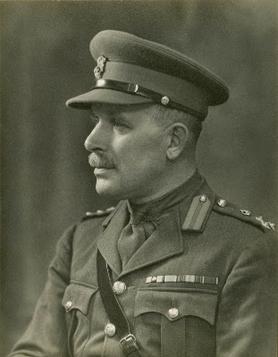
Major General George William Symes, was a senior British Army officer who served in the First World War, in which he was twice awarded the Military Cross. During the Second World War he commanded the 70th Infantry Division in India, and was deputy commander of the Special Force, commonly known as the Chindits, in Burma. He was deputy commander of the lines of communication of the 21st Army Group from May to November 1944, and then commanded the lines of communication in South East Asia Command (SEAC). In June 1945, he became general officer commanding (GOC) in Southern Burma.
David M. Paton (1913–1992) was an Anglican missionary to China, working under the Church Missionary Society.
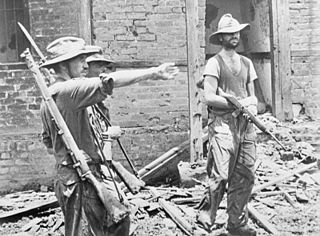
The Battle of Mogaung was a series of engagements that was fought in the Burma Campaign of World War II between 6 and 26 June 1944 at the Burmese town of Mogaung. In brutal fighting, the 77th 'Chindit' Brigade under Brigadier Michael Calvert, later assisted by Chinese forces of Generalissimo Chiang Kai-shek, fought for and captured the town from the occupying forces of Imperial Japan.















